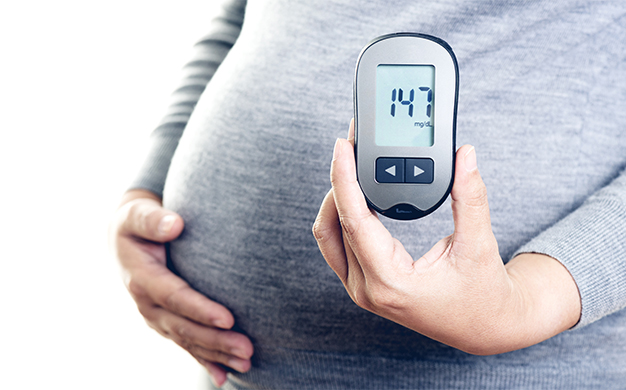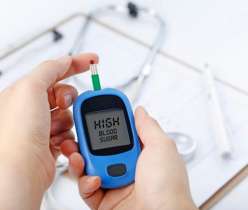Gestational diabetes develops only in pregnant women. Gestational diabetes mellitus, new onset of glucose intolerance first diagnosed during pregnancy, complicates up to 7% of all pregnancies. For many years and even recently, gestational diabetes has been controversial.
If left untreated and undiagnosed, the type of diabetes can harm both mother and baby, including excessive fetal growth, birth injuries, stillbirth, fetal hypoglycemia, increased caesarean delivery, other metabolic derangements, and long-term medical risks for both mothers and babies. With early intervention and close regulation of fasting and postprandial glucose levels, women with gestational diabetes can experience improvement.
Gestational diabetes is diabetes diagnosed for the first time during pregnancy. Like other forms of diabetes, gestational diabetes affects how your cell use sugar. Gestational diabetes causes high blood pressure, affecting your pregnancy and your baby’s health.
While any pregnancy complication of diabetes mellitus is concerning, fortunately, during pregnancy, you can gain control over gestational diabetes by following healthy lifestyle habits (eating healthy foods, exercising) and, if necessary, taking medicine. High blood sugar levels can keep you and your baby healthy and prevent complications associated with delivery.
If you are dealing with gestational diabetes during pregnancy, generally, your blood sugar returns to its normal levels soon after delivering the baby.
If you develop gestational diabetes during pregnancy, your blood glucose levels generally return to their usual level soon after delivery. But if you have had gestational diabetes mellitus, you have an increased risk of getting type 2 diabetes mellitus. You will need to be tested more often for changes in blood glucose levels.
Gestational diabetes is temporary and develops during pregnancy when the body stops releasing or responding to insulin adequately.
If your body cannot respond to insulin properly, high sugar levels build up in the bloodstream and give rise to the symptoms of diabetes. Gestational diabetes can potentially cause certain health risks to the expecting mother and the baby. These health risks include:
-
-
- Premature birth
- Higher birth weight of the baby
- Low blood glucose levels in the baby at the time of birth
- An increase in the number of women developing preeclampsia during pregnancy
- An increase in blood pressure in pregnant women.
-
As mentioned above, gestational diabetes resolves following pregnancy. Doctors usually check the woman’s blood sugar levels after delivery and then again within six weeks. Please continue to read to learn more about gestational diabetes symptoms and how doctors diagnose it.
Also Read – Do’s And Don’ts When You Have Diabetes
What are the signs & symptoms?
Gestational diabetes may not cause obvious symptoms, as many changes can be similar to normal diabetes. In most cases, gestational diabetes doesn’t cause visible symptoms. If you develop gestational diabetes mellitus symptoms, they may be mild, such as being thirstier than normal and more frequent urination.
Increased thirst and more frequent urination are possible symptoms. Other possible symptoms include nausea, blurred vision, fatigue, sugar in the urine, extreme thirst, frequent bladder, and vaginal or skin infections. Women dealing with new or unusual diabetes mellitus symptoms during pregnancy should talk to their doctor. The doctor may be able to identify whether she has developed gestational diabetes mellitus or any other condition.
What causes gestational diabetes?
Similar to Type 2 diabetes, gestational diabetes when the body is no longer able to respond effectively to insulin. The condition is often referred to as insulin resistance. When body cells do not properly absorb glucose, sugar is in the blood, resulting in increased glucose levels appearing on blood tests. Insulin resistance in pregnant women majorly develops due to hormonal changes.
Gestational diabetes occurs because of placental hormones, it can increase resistance in susceptible individuals. These can increase insulin resistance in susceptible individuals. It is still not understood why some women don’t tolerate these hormones well and ultimately develop gestational diabetes.
Other changes during pregnancy, such as eating, exercising less, and having larger fat deposits, can give rise to insulin resistance. These changes allow the growing fetus access to more nutrients. The woman’s body compensates by producing more insulin, but sometimes even this extra insulin is inadequate to keep glucose levels normal, resulting in diabetes.
Several factors increase a pregnant women’s risk of developing gestational diabetes, including:
-
-
- Prediabetes
- A personal or family history of gestational diabetes
- High blood pressure
- A family history of Type 2 diabetes
- Being overweight or gaining too much during pregnancy
- Being older than 25 years old
- Previously having an unexplained stillbirth or miscarriage
-
Still, some women without any risk factors develop gestational diabetes due to their intolerance of placental hormones.
Diagnosis
A doctor may diagnose gestational diabetes mellitus in women during a routine health check-up of pregnant women. Typically, they will ask the pregnant woman how she feels and ask for a urine sample. If they found the presence of sugar in the urine sample, they may conduct a screening for gestational diabetes. Most women will undergo a screening test for gestational diabetes mellitus between 24 and 28 weeks of pregnancy. Women with an increased risk of developing gestational diabetes mellitus may need more frequent testing.
Also Read – Diabetes and Exercise: When To Monitor Your Blood Sugar
Treatment
If diet and exercise are insufficient to manage your blood glucose levels, you may need insulin shots to lower your blood sugar. Some women with gestational diabetes need insulin to reach their blood sugar targets.
Some doctors prescribe oral medications to manage the treatment of blood sugar. While others believe more research is required to confirm that oral anti-diabetic agents are safe and as effective as injectable insulin in managing gestational diabetes. You can also buy prescriptions online. Reliablerxpharmacy is the safest online pharmacy to buy prescription medicine online. It is one of the best online pharmacies in the US.
Furthermore, observing your baby closely is an important part of the treatment plan. Your doctor may check your baby’s growth and development and recommend repeating ultrasounds or other tests.




